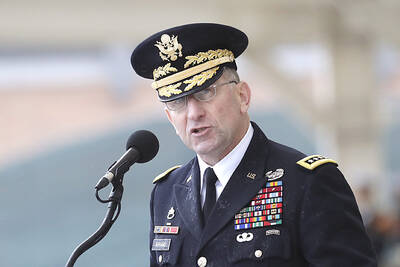In bustling Taipei where parking spaces are scarce and traffic is perpetually congested, skate scooters have recently emerged as one of commuters' and youngsters' favored ways to get around town and exercise at the same time.
It is not unusual to see riders maneuvering their skate scooters among motor scooters, cars, and buses. The free-wheeling fun and games may come to an end though as the swelling army of scooter riders kicking their way around parks, sidewalks and major boulevards has prompted debate among Taipei City councilors over whether to create regulations for the new transportation device.
"We would like to see the city government take protective measures in advance so there will be rules for the public to follow should any mishaps occur," said KMT city councilor Chen Yu-mei (
KMT councilor Wang Cheng-te (
"Because the city encourages the public to take advantage of the MRT, it has gained tremendous popularity because it's easy to carry and its size is compact."
New Party councilor Chin Li-fang (
Tsao Shou-min (
Therefore, they are regulated under pedestrians laws.
Current traffic regulations stipulate that pedestrians causing traffic inconvenience are subject to NT$360 fine and users obstructing lanes with vehicles face a NT$120 fine.
Tsao said as long as owners try to restrict their usage of skate scooters to sidewalks and do not cause any traffic problems, he doesn't have any problem with seeing it on the streets of Taipei.
Chen Chun-liang (陳椿亮), general manager of the city's Taipei Rapid Transit Company, said announcements will be made or posted at subway stations informing people of the company's stance.
"Owners have to fold [the scooter] before they enter the station. They will receive warnings if they do not, and the equipment may be confiscated and the owner told to leave the station if the person refuses to cooperate," he said.

‘FORM OF PROTEST’: The German Institute Taipei said it was ‘shocked’ to see Nazi symbolism used in connection with political aims as it condemned the incident Sung Chien-liang (宋建樑), who led efforts to recall Democratic Progressive Party (DPP) Legislator Lee Kun-cheng (李坤城), was released on bail of NT$80,000 yesterday amid an outcry over a Nazi armband he wore to questioning the night before. Sung arrived at the New Taipei City District Prosecutors’ Office for questioning in a recall petition forgery case on Tuesday night wearing a red armband bearing a swastika, carrying a copy of Adolf Hitler’s Mein Kampf and giving a Nazi salute. Sung left the building at 1:15am without the armband and apparently covering the book with a coat. This is a serious international scandal and Chinese

PERSONAL DATA: The implicated KMT members allegedly compiled their petitions by copying names from party lists without the consent of the people concerned Judicial authorities searched six locations yesterday and questioned six people, including one elderly Chinese Nationalist Party (KMT) member and five KMT Youth League associates, about alleged signature forgery and fraud relating to their recall efforts against two Democratic Progressive Party (DPP) legislators. After launching a probe into alleged signature forgery and related fraud in the KMT’s recall effort, prosecutors received a number of complaints, including about one petition that had 1,748 signatures of voters whose family members said they had already passed away, and also voters who said they did not approve the use of their name, Taipei Deputy Chief Prosecutor

UNDER ATTACK: Raymond Greene said there were 412 billion malicious threats in the Asia-Pacific region in the first half of 2023, with 55 percent targeting Taiwan Taiwan not only faces military intimidation from China, but is also on the front line of global cybersecurity threats, and it is taking action to counter those attacks, President William Lai (賴清德) said yesterday. Speaking at the opening of this year’s Cybersec Expo in Taipei, the president assured foreign diplomats and exhibitors that Taiwan remained committed to strengthening its defense against cyberattacks and enhancing the resilience of its digital infrastructure. Lai referenced a report from the National Security Bureau (NSB) indicating that the Government Service Network faced an average of 2.4 million intrusion attempts daily last year, more than double the figure

Retired US general Robert B. Abrams reportedly served as adviser to Chief of the General Staff Admiral Mei Chia-shu (梅家樹) during the Ministry of National Defense’s computer-simulated war games in the buildup to this year’s 41st annual Han Kuang military exercises, local media reported yesterday. For 14 days and 13 nights starting on April 5 and ending yesterday, the armed forces conducted the computer-simulated war games component of the Han Kuang exercises, utilizing the joint theater-level simulation system (JTLS). Using the JTLS, the exercise simulated a continuous 24-hour confrontation based on scenarios such as “gray zone” incursions and the Chinese People’s Liberation